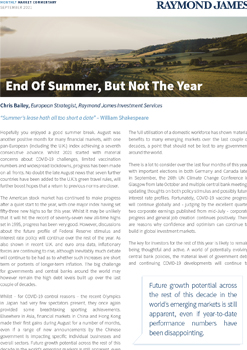Persistent or transitory inflation, that is the question. It’s actually been the question for most of the year and this week was no different, as it appeared the persistent inflation bulls had the upper hand, fighting back after the summer months were won by the transitory inflation camp.
The obvious short-term forces of supply chain bottlenecks, energy shortages and a rebound in demand from the pandemic induced lows are helping stoke inflation, but the longer-term inputs of a move away from globalisation, continued government spending and wage inflation are providing fuel for the persistent inflation believers. The higher inflation expectations have impacted markets this week. US government bond yields have risen (prices therefore fall) to levels last seen in June, while UK gilts and European government bonds have also seen their yields move higher. Equity markets have been bumpy too; stocks which are more correlated with bonds have retreated, while sectors such as energy and financials have proved more resilient.
German elections took place on Sunday, with Angela Merkel stepping aside after 16 years as Chancellor. Her party, the Christian Democratic Union, performed poorly, losing significant votes from previous elections. With no clear party winner, a coalition government is likely, yet we still do not know how that will look. Given Germany’s economic power within European markets will be watching proceedings very closely indeed.
On domestic shores the petrol shortage has continued to rumble on, snatching the headlines from the gas crisis that we’ve also been experiencing. The energy crisis facing the UK is fast becoming a global problem, hitting the world’s second-largest economy, China. Reports of factory closures and power rationing will undoubtedly feed through to weaker economic data in the coming months while also increasing supply issues, given China’s role as the manufacturing heartbeat of the global economy.
There was some positive news to end the week, with the UK economy growing faster than anticipated in Q2. Data on consumer savings also highlighted that we are continuing to save at elevated rates. These savings will likely be spent in the real economy as consumer confidence returns, meaning we could see further upside surprises to UK growth. Increasing consumer demand at a time when supply issues are apparent would do little to dampen the persistent inflation camp!
Andy Triggs | Head of Investments, Raymond James, Barbican
With investing, your capital is at risk. The value of investments and the income from them can go down as well as up and you may not recover the amount of your initial investment. Certain investments carry a higher degree of risk than others and are, therefore, unsuitable for some investors.


